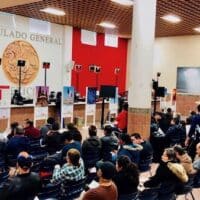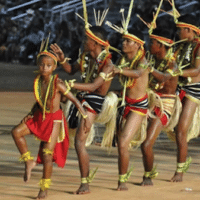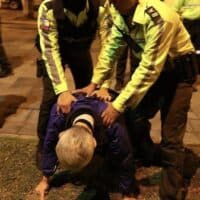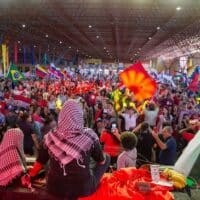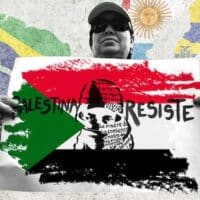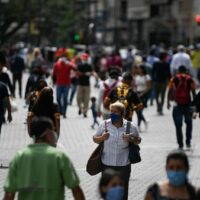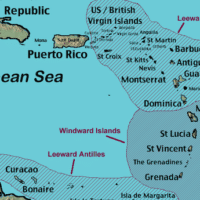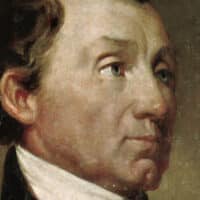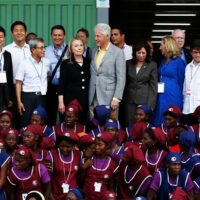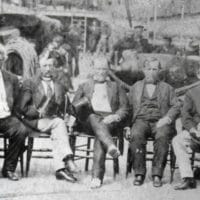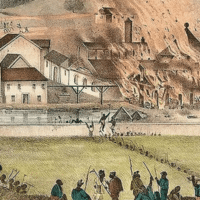-
Meet the DC think tanks impoverishing masses of Latin Americans
These top Washington think tanks are lobbying lawmakers for sadistic sanctions on some of the hemisphere’s poorest countries while raking in millions from corporations and arms makers.
-
Mass incarceration arose out of empire building across North America, Carribean and Pacific
The United States today has by far the world’s largest incarceration rate, with nearly two million people living in prisons and jails. The conditions in those facilities are often substandard, with Amnesty International criticizing the dehumanizing practice of holding prisoners in prolonged solitary confinement. Benjamin Weber’s book, American Purgatory: Prison Imperialism and the Rise of […]
-
Mexico prepares its consulates in the U.S. to face Trump’s mass deportations
Mexican President Claudia Sheinbaum reaffirms support for migrants amid Trump’s deportation plans, and proposes a regional summit to address the causes of immigration.
-
A rare celebration of Indigenous Pacific cultures underscores the cost of climate change
The festival highlights a cultural scene that is threatened by rising seas and dangerous storms.
-
Latin America responds with unanimous condemnation to Ecuador’s storming of the Mexican Embassy in Quito
Latin American and Caribbean leaders and governments from across the political spectrum have condemned the incursion into Mexico’s embassy as a grave violation of international law.
-
“Letter to the People for the Integration of Latin America and the Caribbean” launched at Foz do Iguaçu conference
From February 22 to 24, 4,000 people from more than 20 countries gathered in Foz do Iguaçu for the Conference on the Integration of Latin American and Caribbean Peoples
-
Why Latin America and the Caribbean stand with Palestine: Israel viewed as U.S. proxy
The countries of Latin America and the Caribbean, with a few notable exceptions, have been critical of Israel’s ongoing campaign of genocide in Gaza. Perhaps more than any other region, they have expressed their solidarity with Palestine. Most recognize that the partnership between U.S. imperialism and Israeli Zionism applies not only to Palestine, but also […]
-
Venezuela: Gov’t to launch China-backed anti-poverty program
The Social Equality and Happiness Mission will adapt the Chinese experience to the Caribbean country’s reality to alleviate poverty and inequality.
-
U.S. moves to curtail China’s economic investment in the Caribbean
On March 8, 2023, General Laura J. Richardson of the United States (U.S.) Southern Command gave testimony at a congressional hearing wherein she issued a warning to U.S. lawmakers about the expansion of Chinese influence in the Caribbean that were at odds with purported U.S. interests in the region.
-
200 years of the Monroe Doctrine: History and present
The Monroe Doctrine served Washington to declare unilaterally and as if it were a divine right, protector of the American continent, letting the rest of the world know where its zone of influence, expansion and predominance resided.
-
More than meets the silk press: Kamala Harris and U.S. imperialism
Kamala Harris wants to be your aunty. The Biden Administration’s controversial Vice President is often presented as either an incompetent sidekick, or a lovable big sister figure who “stays with her hair done”.
-
NATO’s growing military presence in Latin America and the Caribbean (Part I, II & III)
At the end of last year, the United States had installed 12 military bases in Panama, 12 in Puerto Rico, 9 in Colombia, 8 in Peru, 3 in Honduras, 2 in Paraguay, as well as installations of this type in Aruba, Costa Rica, El Salvador, Cuba (Guantanamo), and Peru among other countries, at the same time that it is orienting its search for the total coverage of the land and maritime surface of the region.
-
Haiti in the Caribbean: A political economy perspective on the urgent crisis of imperialism
If Haiti is “the poorest country in the hemisphere” it is because imperialist policies continue to impoverish and destabilize that nation.
-
Stability in a destabilized region
The electoral victories of Gustavo Petro and Inacio Lula da Silva this year in Colombia and Brazil have raised hopes for a new strong impulse towards the full emancipation of Latin America and the Caribbean.
-
Ralph Gonsalves: “Latin-Caribbean integration is necessary, but it has been discontinuous”
The small island countries of CARICOM have given a demonstration of dignity and sovereignty, maintaining firm positions on the U.S. interference policy against Cuba, Nicaragua and Venezuela.
-
NATO’s warmongering voice in the Caribbean
Since the start of the war in Ukraine, Sir Ron Sanders, Antigua and Barbuda’s ambassador to the U.S. and the OAS, has emerged as one of the most strident Caribbean voices in favour of U.S./NATO warmongering in eastern Europe.
-
Frederick Douglass and American Empire in Haiti
Toward the end of his life, Frederick Douglass served briefly as U.S. ambassador to Haiti. The disastrous episode reveals much about the country’s long struggle for Black sovereignty while always under the threat of U.S. empire.
-
It’s all in the flag: Bussa’s Rebellion and the 200-year fight to end British rule in Barbados
Prince Charles, as a representative of Queen Elizabeth II, was in attendance, providing a royal seal of approval. Barbados gained its independence in 1966, though the new nation kept ties to its former overlords by keeping Elizabeth II as a symbolic head of state.
-
Britain’s legacy of brutal slavery in Barbados
Yes, the British Empire is indeed one colony smaller as Barbados formally declared itself independent of its colonial rulers after 400 years yesterday in a big ole fancy ceremony attended by all kinds of dignitaries.
-
An unrealized political possibility: remembering the Grenada Revolution
The United States overthrow of the Grenada Revolution in 1983 initiated a vicious and unrelenting regime of neoliberalism that has gutted the Caribbean nation. But revolutionary Grenada showed the world a radical alternative to capitalism and neocolonialism is possible.

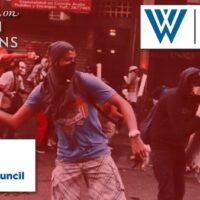
![[Source: newyorker.com]](https://mronline.org/wp-content/uploads/2025/01/Screenshot-2025-01-14-at-42345 PM-200x200.png)
